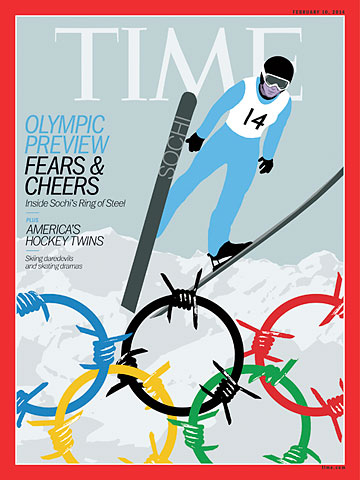
On the foggy Friday afternoon of Jan. 17, a convoy carrying Russia's top Olympic managers crawls up a narrow ridge of the Caucasus Mountains toward the Laura sports complex, one of the venues that will host the Winter Games. But the real master of the Games--Russian President Vladimir Putin--is already inside.
With the Sochi Olympics scheduled to begin on Feb. 7, nearly all the preparations have been finished. What's left are the last-minute security precautions, "what we call fine-tuning," says Dmitry Chernyshenko, head of Russia's Olympic Organizing Committee. But all eyes in the final days are on Putin, who insists on managing the last details himself. He's already laced up his skates to test the ice at the hockey rink. As the top Olympic managers wait in a conference room on an upper floor of the Laura complex, Putin pauses for several minutes in a ground-floor hallway, his head bowed, to inspect a report on Sochi's transportation system. In whispers, his bodyguard warns me not to interrupt. "He considers these Games his baby," Chernyshenko tells me afterward. "So it's natural that he's taking care of them himself."
Natural, perhaps, but also necessary. Any security breach, let alone a terrorist attack during the Games, could blow a hole through Putin's carefully constructed and fiercely guarded image as Russia's great protector. Too much has already been wagered on this effort for him to leave anything to chance. Russia has spent nearly $2 billion on security alone, while the total cost of more than $50 billion will make these the costliest Olympics ever.
If all goes smoothly, Sochi could be the redeeming triumph of Putin's career. A Sochi Games remembered for medals, records and hospitality rather than terrorism and fear could demonstrate that the rigid command structure he has installed during his nearly 10 years as President and nearly five as Prime Minister--running a government his critics dismiss as deeply corrupt and inefficient, sputtering along on easy profits from the sale of oil and gas--was exactly what was needed to show the world that modern Russia is capable of hosting one of the world's greatest celebrations of sports.
But the attention Putin has lavished on "his baby" has also made it an enormously tempting target for his enemies. Sochi lies a day's drive from the heartland of insurgents who have been fighting for more than a decade to turn the region into an Islamic state. Their tactics include regular suicide bombings: in the four months leading up to the Games, four separate bombings have struck cities close to Sochi, one in Pyatigorsk and three in Volgograd, killing at least 43 people and wounding dozens more. "Every terrorist in the region has been waiting for this chance to hit Putin where it hurts," says Yulia Yuzik, an author who has written two books about suicide bombers in the region.
